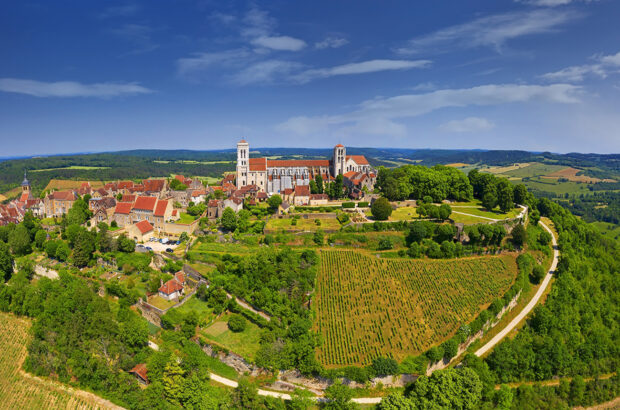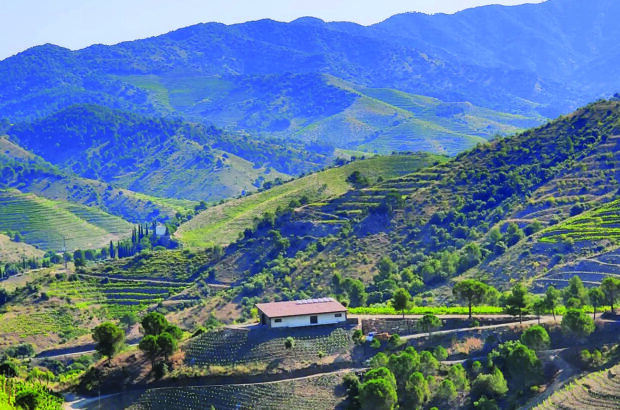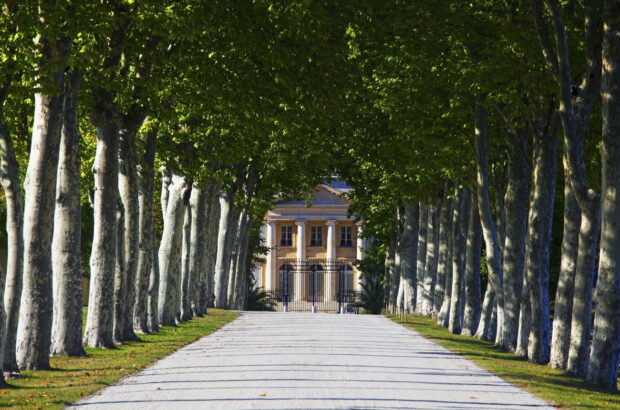Xavier Copel, perhaps by accident, has emerged as France’s upmarket counterpart of the flying winemaker. I had difficulty finding his house in the Entre Deux Mers region of Bordeaux because there was none of the usual impedimenta of a winery: no barrels, no shrink-wrapped stacks of bottles. It was just a house behind a hedge, and only by peering through the window and spotting a row of expensive wine glasses ranged along a table did I know I was at the right place.
Copel graduated from Toulouse University with a diploma in oenology in 1991 and came to Bordeaux, where he gave some courses and traded in wines from southern France, which were unknown quantities in this inward-looking city. But he had always wanted to make wine, and despite a stint at the prestigious Domaine de Chevalier, he wanted to make wine on his own terms. Not so easy when you have no capital, no base and no vineyards.
Then, in 1996, Xavier Copel had an inspiration. He won’t thank me for the term but he became, in effect, a parasite winemaker. For many years he had travelled around France, visiting and talking to top . By this time he knew where to find the best vineyards and the best vignerons throughout southern France. Copel’s idea was to lease vines from a number of growers and then, jointly with the grower, fashion the very finest wine possible, regardless of cost. The resulting wine would then be marketed under a brand name.
In 1996 he produced just 8,000 bottles: a generic Bordeaux and wines from Canon-Fronsac, Cahors, Jurançon, and Sauternes. ‘At that time I still had nothing: no sales structure, not even a name for the wines. Then I came up with the name Primo Palatum. It’s a brand, but perhaps the only brand in Bordeaux dedicated to expensive, top-quality wines.’
The operation is comparable to that of Dominique Laurent in Burgundy. Laurent also purchases grapes from very old vines in a whole range of appellations. But there is a big difference: Laurent prides himself on being an éleveur, nurturing the wines from infancy to bottling. Copel, however, allows the grower to do the élevage. Which is why the Primo Palatum headquarters is no more than a family home with a fax machine.
Regional Profile: Corbières
‘Primo Palatum is a partnership. The growers have to accept my terms, and I will impose my ideas about yield, harvesting dates, vinification and barrel-ageing. Everything. But to do this I also have to win the trust and confidence of the grower. We need to work together. Of course, I pay well for the grapes I buy, and I bear all costs such as new oak barrels and top-quality corks.
‘The first vintage is always the most time-consuming. I need to be at the estate as much as possible. The following years are much easier, as the grower understands what I am after and has seen the results of our joint efforts from the previous vintage.’
The Primo Palatum wines are not for the faint-hearted. They tend to be extreme expressions of any region’s typicity. Copel insists on low yields and is an enthusiast for the controversial technique of micro-oxygenation, which he practices while the wine is still in tanks. All the wines are aged in new Allier barrels, made to his specifications. Some of the red wines are aged in 200% new oak, which means that after malolactic fermentation in new oak, they are racked into brand-new barrels to complete the élevage. The wines are finally bottled without fining or filtration.
Fanatical approach
Selling the wines hasn’t always been easy. The concept of a high-priced brand is unusual, and although he makes wines from Bordeaux – including a stupendous red 1998 Graves from pure Cabernet Sauvignon, and a viscous Sauternes – he also works in less fashionable areas such as Minervois and Côtes du Roussillon, where premium price tags are less common.
Copel’s Jurançon is a good example of his almost fanatical approach. In this region the white grapes – either Gros Manseng or the superior, smaller-berried Petit Manseng – are either picked early to make a dry wine, or harvested later in the autumn when they have shrivelled on the vine and will render small quantities of exquisite sweet wine. ‘In 1996 I left the grapes on the vine until early December. There was a little rain, which brought down the sugar levels without greatly affecting the intensity of the juice. That allowed me to make a completely dry wine from raisined grapes. It’s unique!’
Not entirely, since it comes in two versions: Cuvée Classica from Gros Manseng, and Cuvée Mythologica from Petit Manseng. The latter is indeed an amazing wine: tight and concentrated, with powerful flavours of candied lemons, and a very long honeyed finish. A touch overwhelming, but undeniably impressive. There are two wines from Cahors as well: Classica is aged in 50% new oak and has a gorgeous raspberry-coulis nose; Mythologica is pure Malbec aged in 200% new oak, an ultra-ripe wine with a voluptuous texture and a rich oak intensity.
In recent years Primo Palatum has expanded, although the total output in 1999 was still only 4,000 cases. Growers in Navarra and Priorat invited Copel to make some wines in their regions, and Quinta de la Rosa in the Douro Valley gave him some grapes to work with in 1998. This vintage port is good, but I don’t think the major shippers need to tremble just yet.
Xavier Copel, a man of great intensity and eloquence, is not given to self-doubt. He thinks his wines are great, and some of them certainly are. They are made in a very bold, highly extracted style, and are not to everyone’s taste. But he has shown what can be done in areas such as Cahors and Roussillon, demonstrating that old vines from the best terroirs can be the source of powerful and imposing wines. Some may be too powerful, and I wonder whether, after the first explosive fruitiness of the wines is in retreat, they will age gracefully.
One has to admire Copel for his courage, and the growers for allowing him to rampage through their vineyards and wineries. The growers he works with are at liberty to identify themselves, but so far none has done so. They bask in their anonymity and enjoy the reflected glory from the critical success of Primo Palatum. Although the wines are often made in quantities as low as 200 cases, some bottles are finding their way out of France and are worth searching for.












